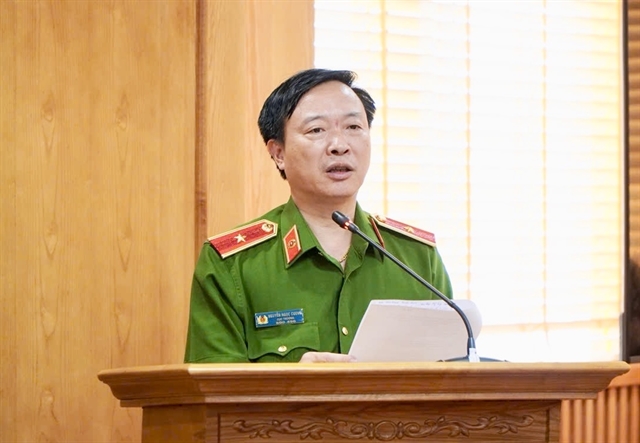 Opinion
Opinion

 |
| Major General Nguyễn Ngọc Cương, Director of the National Data Centre under the Ministry of Public Security. — Photo VGP |
Việt Nam’s push for comprehensive digital transformation has placed digital infrastructure at the centre of national development, forming the backbone of the digital government, economy and society. This foundation is considered vital to driving innovation, attracting investment, boosting productivity and enhancing the country’s global competitiveness.
The Government News spoke with Major General Nguyễn Ngọc Cương, Director of the National Data Centre under the Ministry of Public Security (MoPS), to discuss the sector’s vision, responsibilities and solutions for developing, protecting and optimising national digital infrastructure, with an emphasis on ensuring security, safety and digital sovereignty by 2030.
In your view, what role does digital infrastructure play in fulfilling Việt Nam’s vision for 2030, especially as the country advances towards building a digital nation, economy and society?
Digital infrastructure has been identified as a critical pillar for achieving Việt Nam’s national vision to 2030 under the Politburo’s Resolution. It provides the essential groundwork for the development of a digital government, digital economy and digital society. Just as data is considered the new resource, digital infrastructure functions as the channels, repositories and processing systems that allow this resource to be fully leveraged for the country’s sustainable growth.
Amid intensifying globalisation and strategic competition, the creation of a modern, resilient and secure digital infrastructure will not only help Việt Nam align with international trends but also strengthen its position as an independent and self-reliant nation in cyberspace. Central to this effort is the National Data Centre, assigned to MoPS for construction and operation. The centre is set to become a cornerstone in enabling connectivity, integration and data sharing among agencies and organisations, paving the way for a cohesive and transparent national data ecosystem.
Moreover, digital infrastructure is expected to open new avenues for innovation, investment and productivity while improving the country’s competitiveness. However, it also brings heightened requirements for cybersecurity, safety and digital sovereignty. To address these, MoPS together with relevant ministries, sectors, localities and the business community will work in close partnership to advance infrastructure development while safeguarding the digital activities of individuals, enterprises and the State in the era of digital transformation.
What strategic priorities and key measures do you believe are needed to develop, safeguard and optimise national digital infrastructure while guaranteeing its sustainability, safety and digital sovereignty?
Ensuring the effective development, protection and utilisation of national digital infrastructure will require a well-defined set of strategic priorities.
First, it is crucial to build a modern and integrated digital infrastructure with the National Data Centre and shared digital platforms playing a central role. This will enable seamless connectivity, data integration and information sharing across Government bodies and organisations, laying the foundation for a unified national data ecosystem to support socio-economic progress.
Second, cybersecurity and digital sovereignty must be safeguarded amid increasingly complex non-traditional security risks. MoPS will coordinate with ministries, localities and businesses to roll out advanced protection measures, enhance monitoring systems and strengthen the capacity to detect and respond to cyber incidents.
Third, expanding public–private cooperation is essential to mobilise resources and combine the State’s management capacity with the technological strengths and experience of enterprises at home and abroad. This collaboration will be key to ensuring the resilience and long-term sustainability of digital infrastructure.
Lastly, the development of a skilled workforce must be prioritised. Nurturing experts in data science, information security and digital technologies will be critical in meeting the challenges of Việt Nam’s ongoing digital transformation.
 |
| Prime Minister Phạm Minh Chính and delegates at the inauguration of National Data Centre No 1 and the launch of its database system. — VNA/VNS Photo Dương Giang |
In what ways will MoPS help ensure cybersecurity, combat high-tech crime and build public and business confidence in the digital space?
MoPS will play a pivotal role in ensuring cybersecurity, information safety and digital sovereignty, recognising that digital infrastructure can only thrive in a secure and trustworthy environment free from the growing risks of cyberattacks and high-tech crime.
The ministry’s efforts will focus on developing and managing the National Data Centre as a core platform for connectivity, interoperability and data sharing, operated to international standards of security and sustainability.
At the same time, it will strengthen monitoring and response capabilities to counter threats and high-tech crime, ensuring the protection of government, businesses and citizens online.
Close cooperation with the private sector and international partners will bring in advanced technologies while public awareness campaigns will help equip citizens with the skills to safeguard personal information.
By combining these efforts with coordination across ministries, localities and the business community, MoPS aims to both advance and secure national digital infrastructure, building the trust essential for Việt Nam’s digital transformation.
How will MoPS work to improve, connect and make effective use of national databases, not only to strengthen State management but also to create a safe and transparent digital environment that benefits citizens and businesses?
Under the 2030 strategy, the ministry aims to develop and standardise core systems, with the National Population Database at the heart of a connected, unified ecosystem linking ministries, localities and sectoral platforms. This strategy will cut duplication, reduce costs and improve efficiency.
Stronger integration and lawful data sharing will make governance more effective and services more convenient.
Ensuring security and protecting personal information will be a constant priority, helping to foster public trust. In this way, national databases will serve both as a powerful governance tool and as a resource for advancing Việt Nam’s digital government, economy and society.
How does the ministry assess the potential for working with leading technology corporations on management solutions, energy optimisation and safeguarding the system’s security?
To build and operate this strategic facility effectively, the State’s efforts must be complemented by collaboration with top international technology corporations. Such partnerships will be instrumental in developing a secure, modern and sustainable centre, strengthening the country’s digital transformation and advancing its vision for a national digital future by 2030. — VNS